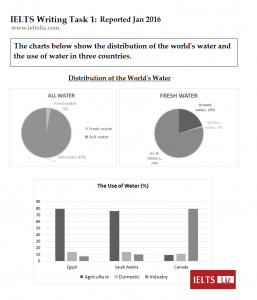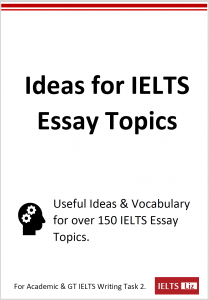IELTS reading practice for matching sentence endings questions. This topic is a biography of Marie Curie, a famous scientist. Skim read the passage before attempting the questions. Please note this is not a practice test but just IELTS reading practice to develop skills and understanding of this type of question.
Download the PDF file for the passage and questions: IELTS Reading Practice Marie Curie
Marie Curie
During the 19th century scientists knew little about what went on inside an atom. However, by the end of the century there were startling new ideas about the structure of the atom resulting from the discoveries of X-rays, radioactivity and the electron.
Marie Sklodowska was born in Warsaw in 1867. She was a brilliant student and dreamed of studying at the Sorbonne in Paris but it took eight years of scrimping and saving before she could afford to go. Despite very poor living conditions and a lack of French she graduated in physics in 1893 and mathematics in 1894.
While looking for a laboratory in Paris to continue with her experiments she was introduced to Pierre Curie, a highly regarded professor at the School of Physics. At 35 years old, Pierre was already an internationally recognised physicist. With his brother Paul-Jacques, he discovered piezo-electricity: the fact that crystals under pressure produce electric currents. He also studied crystal symmetries and the magnetic properties of bodies at different temperatures. His papers had been well received by distinguished colleagues but he was still an outsider in the French academic community. Like Marie he did not care for outward distinctions or a career. They married in July 1895.
During her studies Marie had heard about Henri Becquerel’s discovery of some sort of radiation emitting from uranium salts and decided to investigate these mysterious ‘uranium rays’ for her doctoral thesis. She soon discovered that the intensity of the rays was in direct proportion to the amount of uranium in her sample. Nothing she did to the uranium affected the rays. This, she said, ‘shows that radioactivity is an atomic property’. She also found that two minerals, pitchblende and chalcite, were much more radioactive than uranium itself, and realised that they must contain a new radioactive element.
After the exciting results of Marie’s early experiments, Pierre abandoned his study of crystals to join her in her search for new substances. The couple laboured over their work, Marie carrying out the chemical separations and Pierre taking the measurements. They continued with the painstaking refining and by December 1898 the couple announced the discovery of an even more radioactive substance in pitchblende which they called radium. This discovery had far-reaching effects; opening up the fields of radiotherapy and nuclear medicine.
Matching Sentence Endings
Complete the sentences by selecting the correct ending, A-L (not all letters will be used).
- In the early 20th century, scientists….
- It took Marie 8 years…
- Marie tolerated sub-standard accommodation but still…
- The research of Pierre Curie was received well …
- Both Marie and Pierre shared the same belief that…
- The research by Henri Becquerel …
- On discovering that there must be a hitherto unknown substance …
- The revelation of radium had a momentous impact on …
Endings
- A) by the college where he worked.
- B) lacked French.
- C) had already made novel discoveries about the atom.
- D) by notable fellows in his field.
- E) recognition or vocation was not the main goal.
- F) graduated in two subjects.
- G) had rediscovered the x-ray.
- H) nuclear medicine and radiotherapy.
- I) prompted her to investigate his discovery further.
- J) pitchblende.
- K) her husband relinquished his work for hers.
- L) of economising prior to realise her goal of studying in Paris.
- C
- novel = new / by the end of the 19 century means that this was already happening at the start of the 20th century
- L
- Second paragraph. economising = being careful with money and not overspending = saving
- F
- The answer can be found here: “Despite very poor living conditions and a lack of French she graduated in physics in 1893 and mathematics in 1894.”
- D
- notable = distinguished / colleagues = fellows in his field. Please note that colleague and college do not have the same meaning.
- E
- The answer can be found at the end of the third paragraph: “Like Marie he did not care for outward distinctions or a career.” Please note that “he” refers to her husband, Pierre. outward distinctions = recognition / career = vocation
- I
- The answer can be found in the fourth paragraph: “During her studies Marie had heard about Henri Becquerel’s discovery ………and decided to investigate these mysterious ‘uranium rays’ for her doctoral thesis.”. Prompted means that she was persuaded or it caused her to.
- K
- The answer can be found in the last paragraph: “Pierre abandoned his study of crystals to join her in her search for new substances.”. “he reliquished his work” means that he abandoned (gave up) his work.
- H
- The answer is in the last sentence of the passage: “This discovery had far-reaching effects; opening up the fields of radiotherapy and nuclear medicine. “. The word far-reaching is paraphrased as momentous.
Article from sciencemuseum.org.uk
More Practice with Matching Sentence Endings:
IELTS Reading Passage: Crime & Punishment
All IELTS Reading Practice & Tips
Main IELTS Pages
Develop your IELTS skills with tips, model answers, lessons, free videos and more.






